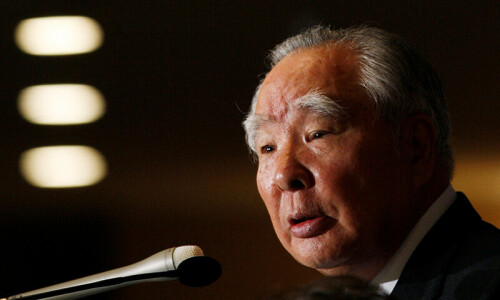KARACHI, June 16: Provincial governors want systematic implementation of the proposed higher education reforms, instead of imposing them in a hurry and at random.
This was disclosed by the chairman of the Steering Committee on Higher Education, Shams Kassim Lakha, at a press briefing held after a meeting of provincial governors with members of the committee at the Governor’s House late on Saturday.
The governors were apprised about the recommendations and the implementation plan pertaining to improvement of higher education in the country. The meeting was aimed to achieve support of the provinces in regard to reforms, which involved provincial role, funding issues and legislation process, said a member who attended the meeting.
The meeting, among others, was attended by two provincial governors from Punjab and NWFP, Khalid Maqbool and Iftikhar Hussain Shah, respectively. The Balochistan education minister represented the governor of his province. Sindh Governor presented the welcome address.
Referring to discussions between the SCHE, governors and the educational ministers of the provinces, Mr Lakha said that the governors supported the recommendations in principle, but they wanted a systematic approach in the related methodology.
“We in the steering committee have been asked by the governors to have a practical approach and work for a phase-wise implementation of reforms being developed for the improvement of the quality of higher education, particularly at public-sector universities,” he added. He also maintained that the governors have also cautioned against making any major changes which cannot be implemented systematically.
He said that the committee had been advised to make changes to the extent necessary, but not in a hurry. “They want a step-by- step implementation of policy-related matters in order to avoid any mess in educational institutions,” he added.
The SCHE secretary-cum-member, Dr Tariq Banuri, said that his committee would give a presentation to President Musharraf in regard to the reforms on Aug 7. “We have been holding consultation meetings with public-sector universities and individual academics across the country. Further consultations have also been planned, including engineering universities, medical colleges and the Federation of All Pakistan University Academic Staff Associations,” he informed.
He said that the committee’s fundamental principle was to ensure that universities became self-governing and autonomous bodies, instead of being state-controlled. The consultations held by the SCHE have provided input into the recommendations already developed, he added.
As a result of the consultations, the SCHE has advanced the conceptual development of its recommendations in a number of areas, he continued, saying that the committee recommended for a significant increase in the salaries and benefits of teachers and de-linking the salaries of university employees from the national pay scale.
It further calls for a massive increase in the financial allocation for support of university-level research, and massive increase in investment in career development and capacity development of faculty and staff of universities in all the three areas relevant to universities, i.e. teaching, research and administration.
Referring to the support for students, Dr Banuri said that the committee stressed for initiating a shift from the current merit- based admissions system towards a need-based system in which students from low-income families would be assured of financial support for the entire expense of higher education.
“We have also recommended a massive increase in investment in career and professional counselling of students, tailoring various educational programmes according to employment prospects and developing the goals of students and early involvement in research,” he added.
Dr Tariq Banuri said that the recommendations called for linking the remunerations of teachers with their performance. “We favour an annual performance review of teaching, research and administrative affairs, under which the performance of a vice- chancellor could also be evaluated,” he said.
The committee also called for explicit support from the government in the case of public-sector universities by massive increase in funding. He said that the committee did not condemn the present working of public universities, but it wanted further improvement in its working as far as academics, management and governance were concerned.
A member of the committee, Salman Akram Raja, said that the recommendations, did not call for the privatization of public- sector universities in any way.
“We are not working for any benefit to the private-sector institutions and are of the considered opinion that the private sector, which generally ran profit-oriented courses and programmes, could not meet the challenges of providing general education to students,” he added and mentioned that the committee wanted to improve the existing system and not to scrape it.
Replying to queries, Mr Lakha said that the SCHE wanted to encourage the existing public-sector universities and to ensure further resources for them so that those could function independently towards the delivery of a higher quality of education. “We have made it clear to the government that if it was not ready to make significant increase in funding to public- sector universities, then vigorous efforts or exercises by SCHE would prove futile,” he mentioned.
The members of the committee said that the impression that a set of new rules were being finalized to do away with the existing university ordinance was incorrect. The good things of the existing system were being refined further. The new recommendations would also not be implemented as any hard and fast measures, while the proposed commission on higher education would establish liaison with the university authorities to iron out difficulties, concluded Dr Tariq Banuri.
Other members of the SCHE who were present during the press briefing included Dr Zulfiqar Gilani, VC Peshawar University; Mazharul Haq Siddiqui, VC University of Sindh; Prof Riazuddin of Quaid-i-Azam University, Dr Suhail Naqvi, Musharraf Zaidi and Dr Shaukat Hamid.















































Dear visitor, the comments section is undergoing an overhaul and will return soon.